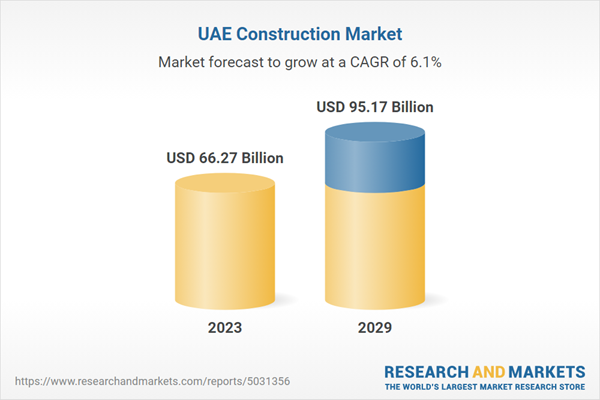The report includes profiles of key market players including Al Naboodah Construction Group (ANCG), China State Construction Engineering Corp., Lennar Corporation, Al Habtoor Group, Skanska, STRABAG, Fluor Corporation and Bechtel Corporation.
UAE hardware store
Dublin, Jan. 2, 2025 (GLOBE NEWSWIRE) — The “UAE Construction Market, by Region, Competition, Forecast and Opportunities, 2019-2029F” report has been updated ResearchAndMarkets.com Offer.
The UAE construction market was worth US$66.27 billion in 2023 and is expected to reach US$95.17 billion by 2029, registering a compound annual growth rate of 6.06%.
Key market trends
Digital Transformation and Building Information Modeling (BIM)
Digital transformation is revolutionizing the UAE construction market, with an increasing focus on leveraging technology to improve efficiency, collaboration and project outcomes. A key trend driving this change is the introduction of Building Information Modeling (BIM). BIM is a digital representation of the physical and functional characteristics of a building or infrastructure project and provides a collaborative platform for stakeholders to plan, design, build and manage projects more effectively.
In the United Arab Emirates, government initiatives and industry contracts are encouraging the adoption of BIM in large construction projects. For example, Dubai Municipality requires all buildings over 40 floors or 300,000 square feet to use BIM in the design and construction phases. The aim of this mandate is to improve project coordination, reduce errors, optimize resources and improve project delivery timelines.
BIM enables improved project visualization, collision detection and virtual construction simulations, allowing stakeholders to identify and resolve potential issues before construction begins. This proactive approach minimizes costly rework, improves project planning accuracy, and increases overall project quality. Additionally, BIM supports sustainable construction practices by enabling energy analysis, life cycle assessments and efficient building operations management.
Beyond BIM, other digital technologies such as the Internet of Things (IoT), artificial intelligence (AI) and drone technology are transforming construction processes in the UAE. IoT sensors monitor construction site conditions in real time, AI algorithms optimize project planning and resource allocation, and drones perform aerial photography and inspections with greater accuracy and efficiency.
Focus on modular and prefabricated construction
Modular and prefabricated construction techniques are gaining traction in the UAE, driven by the need for faster project delivery, cost efficiency and sustainability. These methods involve manufacturing components off-site in controlled factory environments and then transporting and assembling them on-site. This approach shortens construction time, minimizes material waste and improves construction quality through standardized processes.
The UAE construction industry, known for its ambitious infrastructure projects and rapid urbanization, is increasingly relying on modular and prefabricated solutions to meet growing demand for residential, commercial and institutional buildings. Projects such as the Dubai Expo 2020 site have used modular construction techniques to reduce construction time and ensure timely completion of global events.
The modular design offers flexibility in design and scalability, allowing developers to customize building configurations while ensuring consistent quality and performance. This adaptability is particularly beneficial in rapidly growing urban areas, where space constraints and logistical challenges can impact traditional construction methods.
The prefabricated construction supports sustainable development goals by reducing construction waste, minimizing site disruption and optimizing energy efficiency. Factory-based manufacturing processes also increase worker safety by minimizing on-site hazards and accidents associated with traditional construction practices.
Looking forward, the UAE's focus on modular and prefabricated construction is expected to increase, driven by advances in manufacturing technologies, supportive government policies and increased awareness of the benefits of off-site construction methods. These trends position modular construction as a viable solution to address housing shortages, infrastructure needs and sustainability challenges in the UAE's dynamic construction market.
Regional insights
Dubai held the largest market share in 2023. Dubai dominates the UAE construction market due to several key factors that combine to account for its importance in the industry. Dubai's strategic geographical location serves as a gateway between East and West, facilitating trade and attracting international investment. This geographical advantage has spurred extensive urban development and infrastructure projects, making Dubai a hub for commercial, residential and tourism construction.
Economically, Dubai's diversified economy and business-friendly policies have created a favorable environment for construction growth. The emirate's status as a global financial center and regional business hub has resulted in continued demand for modern office space, commercial complexes and luxury real estate developments. This demand drives ongoing construction activities and drives innovation in architectural design, sustainable construction practices and technological integration.
Dubai's robust tourism sector plays a crucial role in shaping its built landscape. The emirate's famous landmarks such as the Burj Khalifa, Palm Jumeirah and numerous luxury hotels and resorts attract millions of visitors every year, necessitating the continuous construction of hospitality facilities, entertainment venues and cultural attractions. Projects such as Expo 2020 Dubai further strengthened construction activity and demonstrated Dubai's ability to host global events and drive infrastructural advancements.
Dubai's ambitious urban planning initiatives such as Dubai Plan 2040 and Dubai 2040 Urban Master Plan outline sustainable development strategies to meet future population growth and improve quality of life. These plans focus on smart city technologies, green construction practices and infrastructure resilience, promoting long-term investment opportunities in the construction sector.
Important market participants
